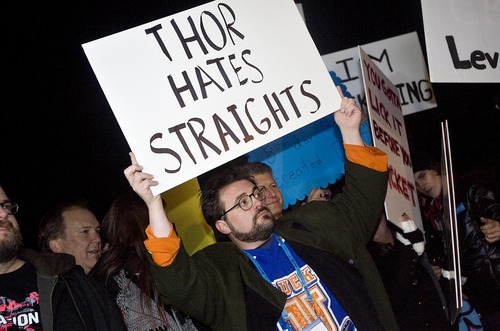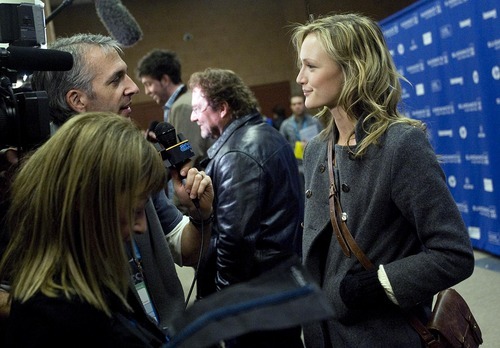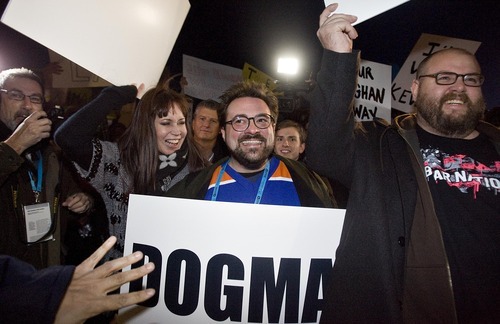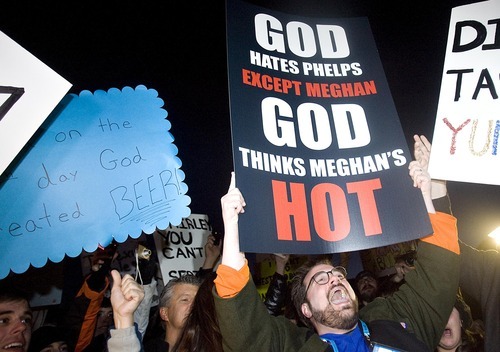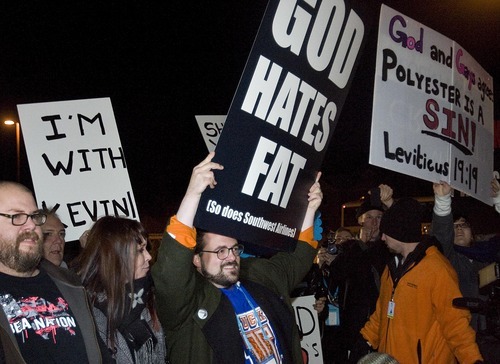This is an archived article that was published on sltrib.com in 2011, and information in the article may be outdated. It is provided only for personal research purposes and may not be reprinted.
Park City • With fundamentalist Christians protesting outside and Hollywood deal-makers sitting inside, filmmaker Kevin Smith surprised a packed Sundance Film Festival audience by upending the way movies — or at least his movies — will get into theaters.
Smith had promised to auction off the distribution rights to "Red State," his horror thriller starring Michael Parks as a gun-toting evangelical, after Sunday's premiere screening at Park City's Eccles Theatre. Smith kept the promise, sort of, when his producer Jonathan Gordon opened the bidding — and quickly closed it when Smith bid $20, without allowing other bids.
This quickie "auction" instead became Smith's way of announcing he would release "Red State" himself.
"This is indie film 2.0," Smith said. "It's not enough to just make the movie. We have to learn how to release the movie. Because true independence isn't making a film and selling it to some jackass. True independence is schlepping that s—- to the people, and that's what I intend to do."
Smith blasted the Hollywood model for distributing movies, calling it unworkable for independent films because it requires them to earn too much money at the box office.
Smith used "Red State" as an example. It cost under $4 million to make. If he sold it to a distributor at Sundance for $4 million or, optimistically, $6 million, that distributor would then spend upwards of $20 million on marketing it.
"For me, the idea of giving somebody else five times the amount of the budget for the movie that we all collectively made, worked our asses off real hard, to sell the thing, just seems obscene," Smith said, adding that the movie would have to make double what the distributor spent before it started to turn a profit.
Selling "Red State," Smith said, was "akin to having a baby and then handing it over to someone else to raise."
Smith's "indie film 2.0" resembles the old movie practice called "four-walling, " in which filmmakers distribute a movie and cut the studio out of the deal. It's not uncommon with regional filmmakers, such as those who make movies in Utah for the LDS market.
Smith, who has declined all media interviews, said he would use his Smodcast.com website and his Twitter following to publicize the movie, and not spend any money on advertising.
"I've got an audience, ladies and gentlemen — they come see the s—- I do," Smith said. "I was able to sell out Carnegie Hall without spending a f—-ing dime in advertising."
"Red State" will be released in theaters nationwide Oct. 19 — 17 years to the day, Smith said, that his 1994 debut film "Clerks" got its nationwide release.
Before that, Smith will take the movie and Parks on a "road-show" tour, starting March 5 at Radio City Music Hall in New York. He announced several tour dates, including one in Kansas City, near the notorious fundamentalist Westboro Baptist Church, "so maybe I'll go picket their f—-ing house."
A group of about a dozen Westboro picketers stood in the cold protesting the movie and Hollywood in general, with their patented anti-gay rhetoric. A character in "Red State" refers to Westboro and its leader, the Rev. Fred Phelps, but differentiates them from the heavily armed Christians in the film, saying "they're suers, not doers."
Before the movie, Smith mocked the Westboro crowd, referring to "the Von Trapp family singers outside" and showing the Eccles audience his own counter-protest signs.
There was a sizable counter-protest already, with about 100 people holding up handmade signs. One read, jokingly, "Hell is Fabulous."
The holder of that sign, Dustin Trent, 20, an openly-gay political science student at Weber State University, said, "I am having a hard time understanding why I am the downfall of society."


